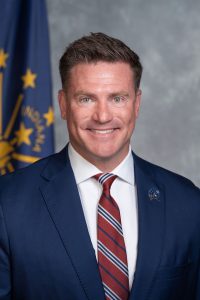Subscriber Benefit
As a subscriber you can listen to articles at work, in the car, or while you work out. Subscribe NowKey Republican lawmakers on Tuesday scolded the Indiana Gaming Commission over how it levies fines and more — threatening to take legislative action if changes aren’t made.
The agency, meanwhile, said it has abided by its rules and statutes and listed accomplishments.
“It appears that the ideology is because casinos are profitable in Indiana, we should be able to fine them more,” said Sen. Chris Garten, R-Charlestown. That profitability, he added, “doesn’t give you the right.”
Executive Director Greg Small responded that the purpose behind the agency’s regulatory scheme is to drive compliance.
“And, by the way, we also have a mandate in statute that economic performance of the casinos and their hiring is of the utmost importance, and we certainly respect that,” he said.
They spoke at a six-hour State Budget Committee meeting that included testimony on a $1 billion Medicaid hole and an opaque quasi-public economic development agency.
The blistering hourlong discussion came as the IGC attempted to obtain “safe harbor” for regulations otherwise threatened by year-end deadlines in a Garten-sponsored overhaul approved last session.
The committee previously left the IGC off its November meeting agenda, prompting fears the agency would be unable to fulfill basic regulatory functions.
‘Subjective’ fines and fees?
Garten accused the agency of “just charging whatever the heck” it wants to casinos in the form of fines and fees.
Indiana’s gambling industry, like most others, is heavily regulated. Casinos sometimes fail to withhold winnings for delinquent child support, prevent underage gambling, prevent self-excluded former gamblers from getting back on the floor and more — and are regularly fined for those violations.

Garten noted that for the past five years, Indiana’s casinos collectively paid more money in fines with each year — until 2023. The observation was based on seven years of settlement data the IGC included with its proposed fine schedules, obtained by the Capital Chronicle.
Garten said he’d begun meeting with commission staff over his concerns about a year ago, and questioned why this year’s settlement amounts were lower.
“It seems to me that we started meeting — started putting a little bit of scrutiny, started asking a few questions — and very subjectively, actions changed within the agency,” Garten asserted.
Small responded, “I don’t think anything specifically changed.”
Small said the amount could grow because the 2023 data covers just half the year. And he said that, by June, the agency had instituted a fine schedule with changes to child support and licensing violations — based on feedback from casino executives — as part of its efforts to comply with the new law.
“So the accountability factor is what caused you to reevaluate?” Garten pressed. Small said the agency had received little feedback prior.
Garten told Small there were “major, major issues” within the IGC. He said the discussion “shows the subjectivity of an agency.”
But he wasn’t finished.
Lawmakers allege ‘culture’ problem, regulator retaliation
Garten also implied the IGC has a “culture issue.”
Small called his agency “professional, knowledgeable and fair.” He noted that the IGC has opened three casinos since 2017 and is working to manage the opening of another. He also highlighted regulators’ work in navigating the 2019 launch of sports wagering, investigators’ busts of illegal animal fighting rings and oversight of charitable gaming.
“My folks, I hold them accountable,” he concluded. “… They know the subject matter because they have to. What we do is very complex; we cover a lot of different areas. We’ve got a lot of folks (that) I think do a great job.”
Garten went on to read aloud anonymous complaints from casino operators.
Those operators called Indiana “the most punitive state we operate in” and said they feared “retribution” from Deputy Director Jenny Reske, according to what Garten read.
Earlier, Garten critiqued the agency over what he repeatedly termed “automatic fines.”
“Nothing on our schedule is an automatic fine,” General Counsel Dennis Mullen responded.
Small and Mullen said that on-site gaming agents — which staff casinos 24/7 — investigate alleged incidents and write substantiated ones up in incident reports. The reports go to on-site supervisors, who can send them on to the agency’s enforcement assistant director. A compliance committee conducts further review and can make recommendations for disciplinary actions.
It’s at that point, according to Small, that the agency enters the settlement process. It sends a notice of violation to the casino, which includes a draft settlement agreement with dollar amounts. But the licensee can dispute the claims and provide additional context or mitigating factors. The two parties finalize a settlement.
That’s unless the casino declines the settlement. In that case, the agency can make an administrative complaint and have the Office of Administrative Law Judges take up the dispute, according to Mullen.
Garten countered that judicial deference to the agency puts casinos at a disadvantage, and used finger quotes to argue that the agreements are not actually “voluntary.”
The agency acknowledged that judges defer to its interpretation of its own rules — but not in making factual determinations.
Garten additionally questioned the agency for specifying that it would default to the highest dollar amount penalties on its fine schedule.
Mullen said the language assures licensees that “we’re not going to double dip on a fine that may technically violate one or two or more of the items on our schedule.” Instead, the agency will only pursue the single item with the highest fine.
Legislation forthcoming
Sen. Ryan Mishler, R-Mishawaka, also blasted the IGC for “sharing” a letter he and Garten wrote to the agency asking for clarifications. He spoke after the agency’s presentation on its proposed rules and before other committee members began their questioning.

“I felt that we could work internally and find a solution. We had no intention of embarrassing the Gaming Commission, but later discovered they could do that on their own,” said Mishler, who chairs the powerful Senate Appropriations Committee.
“I can’t comprehend why someone in your agency would be so compelled to share a letter that basically confirms that you don’t know how your agency runs,” Mishler continued. “And so now, I guess I understand some of the concerns that Senator Garten’s had with the lack of leadership within” the agency.
The Capital Chronicle ran portions of a letter it received last month.
Mishler said “we” plan to offer legislation making “some changes in the agency until we have a compromise.”
“I will suggest that you step up, get your house in order and you circle back,” he said.
When Small offered to meet, Mishler declined: “Until you step up, I don’t think there’s a reason to meet. There’s changes you need to make, and then you circle back with us.”
Mishler was unavailable for interviews on his specific grievances.
Other lawmakers questioned the need for such detailed discussion.
“I don’t know why we got off the track and got into their personnel and their culture and all that,” said Rep. Ed DeLaney, D-Indianapolis. “We were here to vote on the fines, not intimidate them or threaten them or back them off. It’s beyond my comprehension what that was all about.”
The Indiana Capital Chronicle is an independent, not-for-profit news organization that covers state government, policy and elections.
Please enable JavaScript to view this content.

